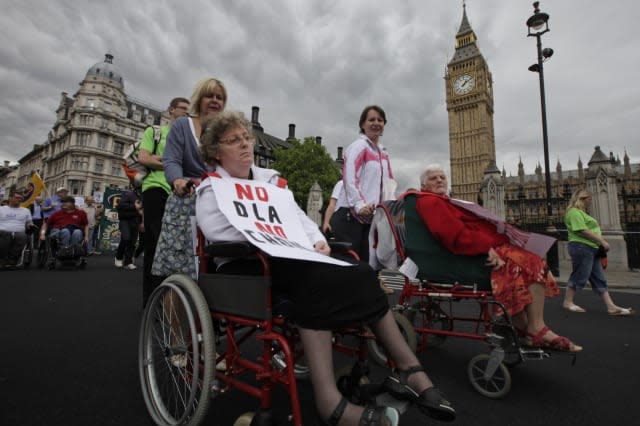Is disability benefit about to be cut by £30 a week?

Life could soon become even harder for people on sickness benefits. Under new and harsher rules they have already had to prove that they are unable to work, and now a leaked Whitehall paper suggests that even if they got through this test, they could still have their benefits cut by £30 a week.
The benefit in question is part of the Employment and Support Allowance. People in receipt of this benefit have been assessed and placed either into a support group - of people who are considered unlikely to ever be able to work - or the work-related activity group - who are expected to prepare to return to work.
The paper suggested that the benefit was not doing enough to incentivise people to get a job, and suggested that the work-related activity group should be abolished, so people's weekly payments would fall £30, to be in line with Jobseekers' Allowance.
It added that instead of being assessed for what they were unable to do, the tests would focus on what they could do - and therefore help identify their marketable skills early in the process. It added that the step could save hundreds of millions of pounds.
The BBC reported the leak, and said that the Department for Work and Pensions had refused to comment on the grounds that it didn't comment on leaks.
Why?
%VIRTUAL-ArticleSidebar-benefits-stories%
The argument chimes with what the think tank, Reform, has been saying for some time. It argues that the employment rate among people with disabilities is artificially lowered by incentivising them to stay on benefits. In a recent blog, Hannah Titley, a Researcher for Reform argued: "Parking people on long term benefits can be isolating and damage their physical and mental health. Radical reform of ESA is needed to assess capability and support more disabled into work. The Government has committed to finding significant welfare cuts. Let us take this opportunity as a time for structural reform."
Why not?
Jane Harris, Director of External Affairs at the National Autistic Society, meanwhile highlights the serious risk for people on the autism spectrum from these proposals. She says: "Just 15% of autistic people are in full-time paid jobs, but 79% on out-of-work benefits want to work. Abolishing the lower level, work-related category of Employment and Support Allowance would remove the little support that disabled people get to prepare for future jobs and ultimately mean they are even less likely to find work in the long-term."
She added that the proposals would also require people who are currently unable to work to apply for Job Seekers Allowance. This, she says, "is designed for people able to actively seek work. We're worried that the vast majority of people on the autism spectrum would struggle to meet the requirements of JSA, such as actively applying for jobs each week, which would lead to their benefits being sanctioned and risk leaving them with nothing to pay for essentials like food, clothing and household bills."
For those who are concerned about cutting benefits for disabled people, it's worth bearing in mind that just because someone somewhere is looking at the option, it doesn't mean that it's part of the government's plans. The government has always said it is having wide-ranging conversations to enable it to identify where it can make £12 billion of cuts from the welfare bill, so there will be plenty of proposals and debates that come to nothing.
Nobody is safe
However, the downside of such wide-ranging conversations is that no one is completely safe from government cuts - except for the pensioners it has promised to protect. Last month David Cameron was asked whether he would rule out cuts to disability benefits - and he flatly refused to
This week we have already seen the end of the Disability Living Fund, a benefit that helped 18,000 people and cost £320 million a year. It was an expensive benefit, paying around £450 a week to people with severe disabilities. It enabled them to pay for personal carers and assistants to provide daily help, so they could live independently, and in some cases go out to work.
The government says the change is administrative and that the cash will go to councils to spend on this care instead - however, only a third of councils have pledged to do this - instead of simply adding the cash to the coffers.
The Emergency Budget next week will give us some insights into where the first cuts will come. However, even if other disability benefits are spared this time, there's no guarantee of safety, because there are likely to be other cuts announced in the spending review in the Autumn.
Disability benefits are expensive - costing the government £37 billion a year. The question is whether regardless of the cost, it's our moral duty to do what is needed to protect the most vulnerable in society, or whether in desperate financial times, we should embrace a spirit of 'every man for himself'. What do you think? Let us know in the comments.
Benefits stories on AOL Money
Ten years of tax credit fraud and error costs £17 billion
Next generation of retirees expect lower pensions
Cruel trick cut off this disabled woman's benefits





